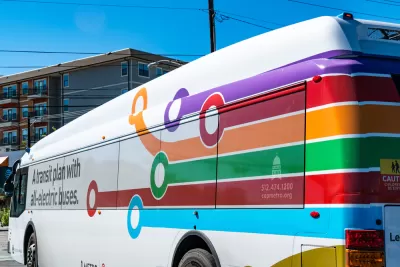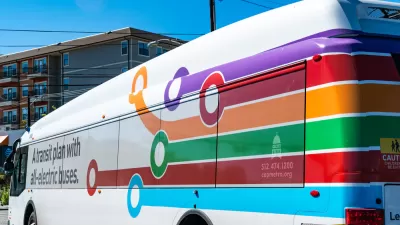The details of drastic reductions to the proposed building program for Austin’s Project Connect long-range transit plan are now open for public comment.

The Austin Transit Partnership (ATP), the government corporation empowered to finance and develop the Project Connect long-term transit plan in Austin has released a proposed revision of the plan, as promised after cost increases forced reductions to the plan.
Nathan Bernier reports for KUT on the revisions, which were leaked earlier this month, but made public on Tuesday, March 21 at a public meeting at the Austin Public Library.
ATP has spent months paring down Project Connect in preparation for the release this week. After seeing the costs for the Project Connect program balloon from an estimated $5.8 billion to $10.3 billion, the plan would now spend less than $5 billion, “including a whopping 40% cost contingency,” reports Bernier.
The ATP hopes a $3.5 billion cushion “will make its pitch more appealing to the federal government,” which is expected to fund up top half of the cost included in the Project Connect program.
The source article, linked below, includes details for each of the five remaining alternatives—all of which represent a significant reduction from the original plan Austin voters approved in the November 2020 election. The original plan called for two new light rail lines, four new rapid bus routes, and a new commuter rail line, as well as expanded service on the city’s existing commuter rail route, in addition to anti-displacement measures and on-demand transit shuttles.
Additional challenges could still await Project Connect if conservative members of the Texas State Legislature manage to approve a proposed bill that would limit ATP’s powers to finance projects. “The Austin Transit Partnership will collect public feedback over the next six weeks,” according to Bernier.
FULL STORY: Austin's light-rail plans have shrunk. Here are 5 new options.

Planetizen Federal Action Tracker
A weekly monitor of how Trump’s orders and actions are impacting planners and planning in America.

Map: Where Senate Republicans Want to Sell Your Public Lands
For public land advocates, the Senate Republicans’ proposal to sell millions of acres of public land in the West is “the biggest fight of their careers.”

Restaurant Patios Were a Pandemic Win — Why Were They so Hard to Keep?
Social distancing requirements and changes in travel patterns prompted cities to pilot new uses for street and sidewalk space. Then it got complicated.

Platform Pilsner: Vancouver Transit Agency Releases... a Beer?
TransLink will receive a portion of every sale of the four-pack.

Toronto Weighs Cheaper Transit, Parking Hikes for Major Events
Special event rates would take effect during large festivals, sports games and concerts to ‘discourage driving, manage congestion and free up space for transit.”

Berlin to Consider Car-Free Zone Larger Than Manhattan
The area bound by the 22-mile Ringbahn would still allow 12 uses of a private automobile per year per person, and several other exemptions.
Urban Design for Planners 1: Software Tools
This six-course series explores essential urban design concepts using open source software and equips planners with the tools they need to participate fully in the urban design process.
Planning for Universal Design
Learn the tools for implementing Universal Design in planning regulations.
Heyer Gruel & Associates PA
JM Goldson LLC
Custer County Colorado
City of Camden Redevelopment Agency
City of Astoria
Transportation Research & Education Center (TREC) at Portland State University
Camden Redevelopment Agency
City of Claremont
Municipality of Princeton (NJ)




























